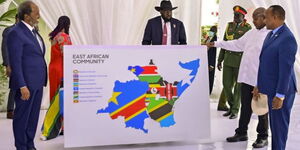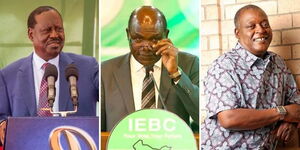As Kenya and the United States gear up for the eighth round of negotiations under the Strategic Trade and Investment Partnership (STIP), the urgency to conclude a long-delayed free trade agreement has intensified.
This comes as President William Ruto prepares for his visit to the United States later this month for the United Nations General Assembly (UNGA).
Why it matters: The Biden administration, nearing its final months, appears eager to cement its legacy by resolving the trade pact, originally initiated under Donald Trump’s presidency.
Meanwhile, Ruto’s government is keen to secure a deal before the African Growth and Opportunity Act (AGOA) expires in 2025. AGOA allows Kenya and other Sub-Saharan African nations to export products to the US without facing tariffs or quotas.
Dig deeper: The next round of talks, set for September 16–27, 2024, in Washington, will be led by Principal Secretary for Trade Alfred K’Ombudo on the Kenyan side, and Assistant U.S. Trade Representative Constance Hamilton for the US. Seven key areas are on the agenda, including agriculture, trade facilitation, and workers’ rights.
According to sources familiar with the talks, both nations are under pressure to finalise the agreement amid growing geopolitical concerns.
The looming expiration of AGOA adds another layer of pressure. The programme has been a critical element of Kenya’s export strategy, with over Ksh50 billion in exports to the US annually.
A new trade deal would ensure continued access to the US market and prevent economic disruptions.
However, the path to an agreement has not been smooth. When Biden took office, he sought to shift away from traditional free trade deals, focusing instead on non-tariff measures to promote trade and investment.
This shift created delays and uncertainty, leaving Kenya in a vulnerable position.
Suzanne Clark, President of the U.S. Chamber of Commerce, has been vocal about her frustration with the slow pace of negotiations. “The US needs to act swiftly. This deal is beneficial for both nations and secures our strategic position in East Africa,” she stated during a recent trade forum.
Clark’s call echoes sentiments within the US business community, eager to capitalise on new opportunities in Kenya, particularly in agriculture and genetically modified organisms (GMOs).
The bigger picture: The trade talks come against the backdrop of China’s growing economic influence across Africa.
The rush to finalise this deal coincides with the breakthrough in the Kenya-EU Economic Partnership Agreement (EPA), which grants Kenya permanent access to the 27-country European market, replacing the EU's temporary market access instrument advanced during the negotiations.
Washington is keen to reduce Beijing’s footprint in the region, making Kenya a strategic ally in the broader geopolitical tussle. A successful trade deal would signal a strengthened US-Kenya partnership, particularly in countering China’s investments in infrastructure and technology.












